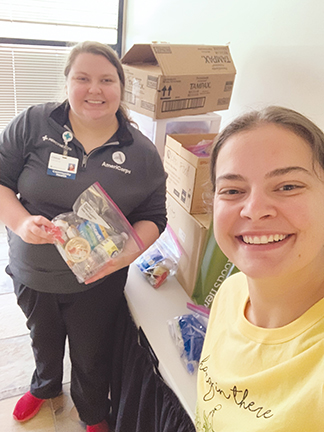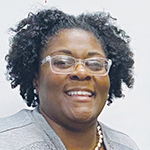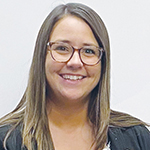By PATRICIA CORRIGAN
Some come to talk about their addictions. Some ask for help. Some are hungry. A listening ear, a referral to a treatment center or a turkey sandwich all are available in the emergency departments of five hospitals in Cincinnati, through Mercy Serves,
a program initiated six years ago by Mercy Health — Cincinnati, part of Bon Secours Mercy Health. The program is part of the health system's response to the national opioid epidemic, which has claimed over a million lives.
 Chloe Caplinger, left, and Courtney Unkrich, part of the Mercy Serves program, assemble homeless care kits with hygiene and nonperishable food items that are given to patients. The AmeriCorps volunteers were part of Mercy Serves' fifth cohort, staying
through last August. The volunteers are deployed for 11 months in the emergency departments of one of Mercy Health — Cincinnati's hospitals. Credit: Mercy Health
Chloe Caplinger, left, and Courtney Unkrich, part of the Mercy Serves program, assemble homeless care kits with hygiene and nonperishable food items that are given to patients. The AmeriCorps volunteers were part of Mercy Serves' fifth cohort, staying
through last August. The volunteers are deployed for 11 months in the emergency departments of one of Mercy Health — Cincinnati's hospitals. Credit: Mercy HealthEach year, Mercy Serves recruits up to 10 volunteers through AmeriCorps, a government-sponsored volunteer organization, to spend 11 months working alongside nurses, other health
care providers and social workers in hospital emergency departments. The volunteers provide patient education about addiction and substance use, conduct risk screenings, identify resources for social services and follow up with patients after discharge.
The goal of the program is to leverage the power of the national service movement and build the next generation of service-minded leaders while simultaneously addressing a critical community need.
The program is funded by ServeOhio, the state's Commission on Service and Volunteerism. Working full-time or part-time shifts, volunteers receive a stipend, a monetary
award to pay for schooling or school debt, health insurance and other benefits.
Mercy Health — Cincinnati reports that from September 2021 through August 2022:
- Close to 1,900 patients were provided with information about substance use or referrals to treatment.
- More than 300 patients reported a change in knowledge or behavior regarding substance use.
- Almost 100 patients were admitted to a local treatment program.
- Nearly 1,000 referrals were made for other social determinants of health such as housing, food and insurance coverage.
 Thompson
ThompsonSince the program began, 51 AmeriCorps members, ages 18 and up, have signed on with Mercy Serves. Tikierra Thompson manages the program. "What drew me to this work is the mission behind the program, what it stands for," she said. "I've been in education
for over 20 years, in classrooms and in administration, and I've had students who worked at Mercy hospitals, so I have been privileged to see the work Mercy is doing in the community."
From all walks of life
Thompson hosts the program's orientation, helps train the volunteers for three to four weeks and oversees some of the professional development sessions. This year, Mercy Serves has four AmeriCorps
volunteers. What they have in common is a desire to serve. "The volunteers come from all different careers, interests and backgrounds, and they are mission-oriented," Thompson said. "They do not have to be interested in medical careers to apply,
though some are. A few previous volunteers have gone on to medical school."
Mercy Serves members are available to work with patients who have substance use disorder issues and crises, and they also speak with anyone coming to the emergency room with health or social challenges or looking for resources that could benefit their
health in some way. "Our members are there to be of service," Thompson said, "but also to provide the human touch, be a listening ear."
Courtney Unkrich signed up for the program because she wanted to do something for her community. "When I joined in 2021, I'd left medical school because I realized that was not where my path lay, but my interest in health care meshed well with the
Mercy Serves opportunity," she said.
Unkrich recalled that every day in the emergency department was different. "You encounter a lot of scenarios, meet a lot of different people," she said. "Patients with substance use issues range on a scale of readiness to make changes. Some are just
not having it — you come in and start talking and they're just not ready. Other people tell you they need help. They want to talk, and I got to be that resource."
Offering the human touch
Sometimes, Unkrich was able to provide different kinds of assistance. "The human touch is missing a lot for some people, and I could sit down and say, 'I'm here for you. Would a Jell-O cup
or a blanket be something you need?' Other times, I'd just ask about their day or have a simple conversation about their grandchildren. Sometimes, patients would tell me they were glad they came in because they met me, and during follow-up later
I would get a text saying, 'I'm still sober.'"
With other volunteers from her cohort, Unkrich developed and acquired funding for homeless care kits for patients. The kits included feminine hygiene products, hand sanitizer, deodorant, a toothbrush and paste and nonperishable food items such as
granola bars and applesauce. "We also provided a list of community resources," she said. "I was happy to see that the kits are part of this year's program as well."
'I've been there'
Adrian Burns is part of the sixth group, which commenced in September 2022. Burns joined the program for a personal reason. "I'm really passionate about Mercy Serves because I'm in recovery from
alcohol," she said. "I am able to relate to patients on that level because I've been there, and I want everyone to be able to experience freedom from alcohol and drugs like I have."
 Burns
BurnsIn the early weeks of the program, Burns hadn't yet met with any patients dealing with substance use issues. "I do advanced care planning training, and otherwise try to fit in at the emergency department where I'm needed, checking to see if I can
offer a warm blanket or a referral to mental health treatment," she said.
"An emergency department can be scary, and most people don't want to be there," she added. "I'm glad I can be a smiling face and provide a human-to-human interaction. I'm really excited to see where this year takes me, and what relationships I will
build."
The Mercy Serves AmeriCorps program recruits a new class of members each year to serve from September through August. Anyone interested in learning more about this program can contact recruiter Tamiko Mauldin at [email protected] or apply at careers.mercy.com by searching "Mercy Serves" to get started.